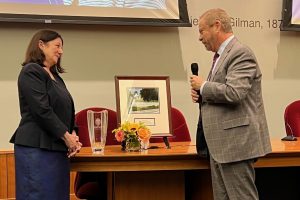Paulette Clancy, the Edward J. Schaefer Professor in Engineering, is known for her work in computational materials processing. Clancy is the director of research for the JHU Data Science and AI Initiative, associate director of the Johns Hopkins Center for Integrated Structure-Mechanical Modeling and Simulation (CISMMS), and a fellow of the Hopkins Extreme Materials Institute (HEMI). She is a Fellow of the Royal Society of Chemistry and the American Institute of Chemical Engineers.
Clancy leads one of the top groups in the country studying atomic- and molecular-scale modeling of semiconductor materials, ranging from traditional silicon-based compounds to all-organic materials. Her group’s research comprises four main areas: advanced organic materials (covalent organic frameworks, antibacterial oligomers, organic electronics); algorithm development (force field development, machine learning, and Bayesian optimization); electronic materials (particularly III-IV semiconducting materials; and nucleation and crystal growth (hybrid organic/inorganic perovskites and quantum dot nanocrystals). Her lab focuses on studies of advanced materials processing and nucleation, including understanding the links between processing, structure, and function.
Current projects include developing new Bayesian optimization methods to encode intuition, modeling woven materials, creating close-to-perfect quantum dots, and discovering polymorphs of electronic materials for shape memory applications.
A fierce advocate for the increased representation of women in engineering and the physical sciences, she was the founding chair of Women in Science and Engineering faculty in Cornell University’s College of Engineering. Among her awards for that advocacy are the American Institute of Chemical Engineers (AIChE) National Women’s Initiatives Mentoring Award, the Alice Cook Award for services promoting women in science at Cornell, and the Zellman Warhaft award for the promotion of diversity in Cornell’s College of Engineering. She has been a panel member of the Department of Energy Computing Leadership Program INCITE (Innovative and Novel Computational Impact on Theory and Experiment) and has held executive positions with the AIChE’s Computational Materials Science and Engineering Forum.
Clancy received her bachelor’s degree in chemistry from Queen Elizabeth College (London University) in 1974, and a DPhil in physical chemistry from Oxford University in England in 1977. She did postdoctoral research at Cornell University and London University and joined the faculty at Cornell in 1987. She spent more than 30 years at Cornell, including eight years as the inaugural director of the Institute for Computational Science and Engineering and as the Samuel W. and Diane M. Bodman Chair of Chemical Engineering. Clancy also served as director of the School of Chemical & Biomolecular Engineering at Cornell and as associate director of the College of Engineering’s Energy Institute. She joined the Whiting School of Engineering faculty in 2018.



